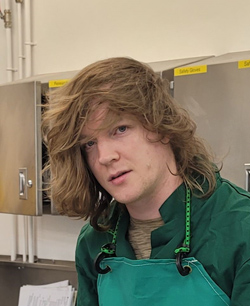Residents
Within the veterinary pathology group are two residents undertaking their training in diagnostic pathology.
Within the veterinary pathology group are two residents undertaking their training in diagnostic pathology.

Anna

Yannick is a Belgian veterinarian with a keen interest in medicine and welfare of free ranging wildlife. With a foundation degree in biology and upon graduating as a veterinarian in 2019, he moved to the United Kingdom to undertake a rotating internship in small and exotic animal medicine. In 2021, he completed an MSc in wild animal health, after which he became the permanent veterinarian at a busy British wildlife rehabilitation hospital. Here, Yannick became aware of the scale at which wild animals are presented for rehabilitation and just how little is known about the diseases and other conditions which they suffer from. This raised his interest in diagnostics and research, which led him to take up the position as ECVP trainee at the University of Liverpool since 2023. For his MSc dissertation, Yannick is investigating the clinical, epidemiological and pathological aspects of respiratory disease in European hedgehogs.
Alberto

Esther graduated from the Complutense University of Madrid in 2022. After graduation, she spent one year working as a diagnostic and research assistance and actively participated in ground breaking research projects at the WOAH Reference Laboratory for Tuberculosis, African Swine Fever, and African Horse Sickness (VISAVET Health Surveillance Centre). This experience solidified her passion for the Veterinary Pathology, particularly in small animal and forensics. This prompted her to move to the UK to pursue further academic training. Therefore, she started an ECVP Residency Programme at the University of Liverpool in 2024. During the last years, she has been fortunate to contribute to scientific publications and congresses communications, along with attending seminars and conferences. Esther has a broad interest in forensics, infectious diseases and liver pathology. While she’s not at work she enjoys going to art exhibitions, practicing yoga and exploring the UK.
Call the department
+44 (0)151 795 6294